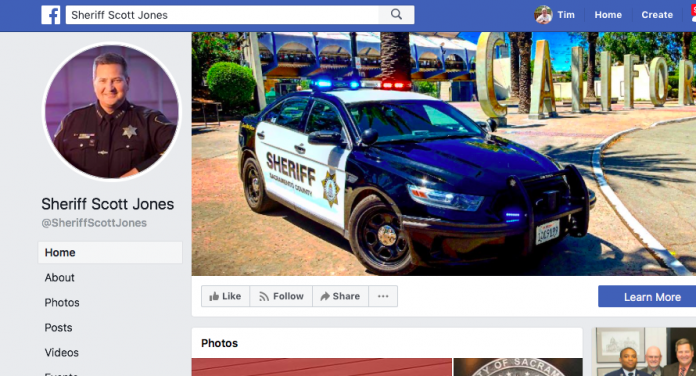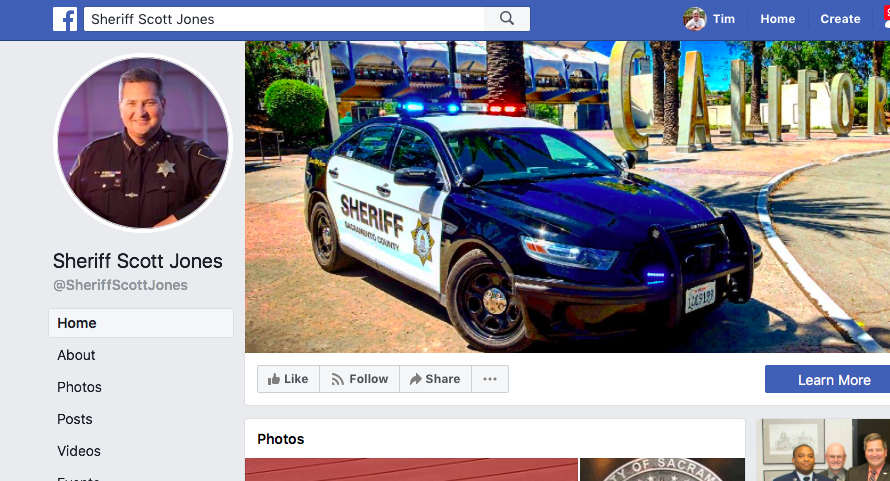
The First Amendment protects freedom of expression, but how does that law, written hundreds of years before smartphones were even imagined, apply to today’s most used medium, social media?
That’s the question the ACLU is raising in a lawsuit against Sacramento Sheriff Scott Jones, who has blocked Black Lives Matter from his official Facebook page.

“The First Amendment should definitely be enforced on social media, as it is a huge part of our society. Everything that applies to your freedom of speech, should be applied to social media, or any medium,” Tanya Faison, a plaintiff in suit, told me.
The ACLU Foundation of Northern California filed the case Jan. 30, arguing that it’s unconstitutional for a government agency to discriminate on Facebook because of identity or views.
When Sheriff Jones refused to allow investigations of the death of Mikel McIntyre, who was killed by a Sacramento deputy, after a critical reports and posts by Black Lives Matter Sacramento were released about the department, Faison and BLM co-leader Sonia Lewis spoke out.
Faison and Lewis posted criticism on the sheriff’s Facebook page, a page he used to gain support of his actions, in October and November. Jones removed their comments and blocked the two, an ACLU Foundation press release said.
“It was important for me to speak out because he is an elected official who wasn’t allowing me to communicate. People were talking about me and I couldn’t explain myself or give my perspective,” Faison said. “It made me feel like I was being oppressed. My voice was not being able to be heard.”
If an elected official makes a page and decides to engage with constituents, then they should be obligated to engage with all constituents, Faison added.
Help us save local journalism!
Every tax-deductible donation helps us grow to cover the issues that mean the most to our community. Become a 48 Hills Hero and support the only daily progressive news source in the Bay Area.
Senior ACLU Staff Attorney Sean Riordan told me he believes the BLM leaders have the right to speak out against sheriff and police department. Unless someone is trolling or engaging in expression that’s making it impossible for others to engage, a public official using a public forum shouldn’t be able to block anyone based on content, Riordan said.
“Today a lot of speech and expression occurs online,” Riordan said. “It is also true that politicians operate social media web pages where they get input from people. It is important for everyone to be able to express themselves on those pages. They should not censor based on opinion or identity.”
In the press release, Riordan said that despite the fact that methods of communication change, the protections don’t. Free speech should be protected on social media just as it is in other forums.
“The sheriff’s decision to silence them based on their views violates their free speech rights, undermines public trust of government, and offends democratic values,” Riordan said.
However, expression on social media is a developing area of the law, he said. A lot of challenges just started and while prior implications do apply, there has not been a lot of input from the judiciary.
“If this is a success, it will map out and guide future decisions. It will allow the opportunity to express oneself [in all mediums],” Riordan said.
A lot of cases are still making their way through the courts, such as the case against President Donald Trump. In May, Trump’s practice of blocking critics on Twitter was declared unconstitutional by a federal judge in Manhattan. Seven Twitter users sued Trump after they were blocked and their letters requesting to be unblocked were ignored. The plaintiffs won at the trial court, but Trump filed an appeal, Riordan said.
The plaintiffs argued that Trump’s feed resembled a “digital town hall” where people could exchange and express their views. By blocking those who he disagreed with, Trump has violated their First Amendment rights, they argued. Judge Naomi Reice Buchwald agreed that the president’s Twitter feed is a public forum, and as a result, by preventing people from viewing his posts, he did violate the First Amendment.
“The viewpoint-based exclusion of the individual plaintiffs from that designated public forum is proscribed by the First Amendment and cannot be justified by the president’s personal First Amendment interests,” Judge Buchwald wrote.
The final decision of this case will create a precedent that can impact Faisons’ and Lewis’ case, among many others. According to Faison, the current political climate has impacted the way public officials treat people and some officials have been emboldened by the way others act.
Ultimately, this case is about not being silenced and calling public attention to racial policing and state violence, Faison said.
“This case is about ensuring that every voice is heard,” said John Heller of Rogers Joseph O’Donnell, the law firm partnered with the ACLU to file suit. “The First Amendment requires no less.”

